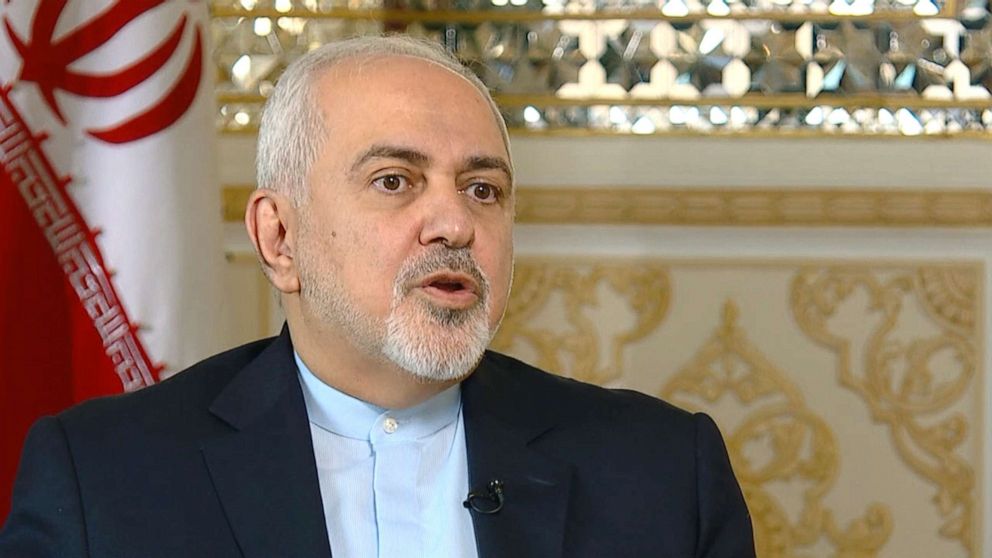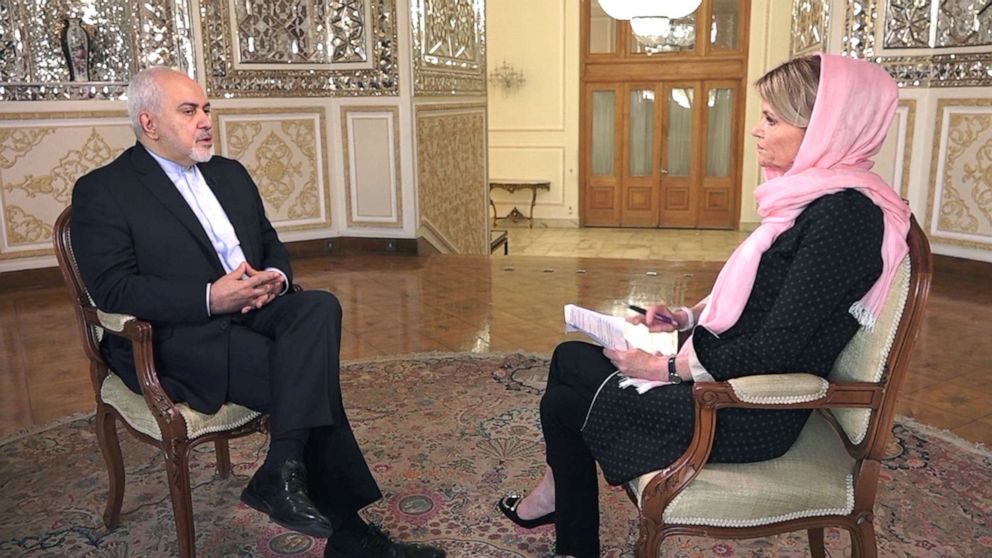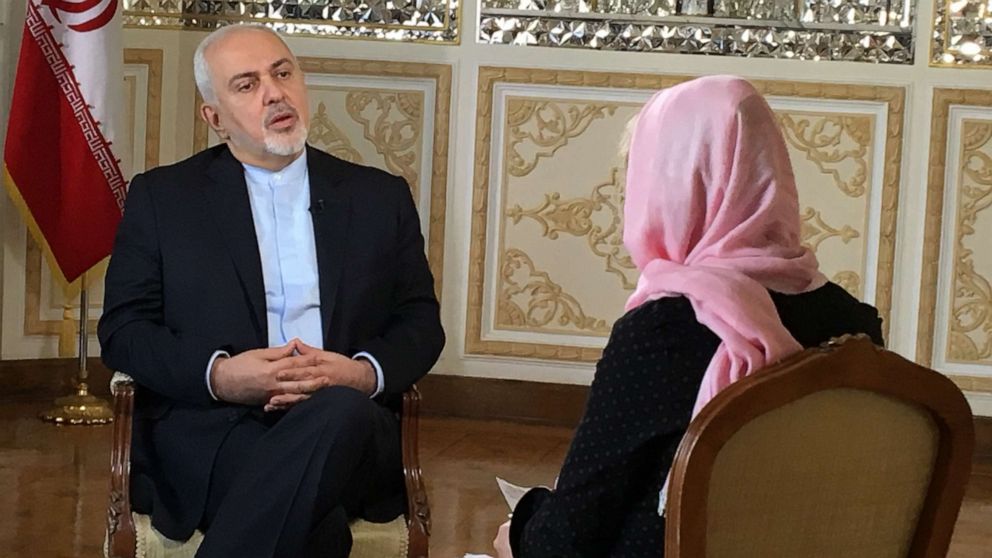Iran's Foreign Minister Javad Zarif says US sanctions are 'economic terrorism'
Iran will not be intimidated by President Trump’s "art of the deal pressure" by using economic sanctions to push Iran to negotiate a new nuclear deal, the country's top diplomat told ABC News.
In an exclusive interview, Iranian Foreign Minister Javad Zarif also told "This Week" Co-Anchor Martha Raddatz that "there will be consequences" if the United States keeps up its economic pressure campaign against Iran’s people.
There was jubilation in the streets of Tehran four years ago in hopes that the lifting of economic sanctions under the nuclear deal -- worked out between the United States, Iran and the European Union -- would improve living conditions.
The only thing that works with Iran is respect.
But when the Trump administration imposed the sanctions again, the double-digit economic growth of recent years was replaced by an economic downturn, as Iran’s oil exports have plunged.
The International Monetary Fund says Iran’s economy shrank by 3.9% and inflation spiked 31% in 2018, with predictions it could rise to 37% this year.
Prices for red meat and poultry climbed by 57%, vegetables by 47%, and milk, cheese and eggs by 37%, according to the Statistical Center of Iran.
Zarif labeled the new U.S. sanctions as "economic terrorism" that "targets ordinary Iranian people" because even though food and medicine are exempted from the sanctions, the financial transactions associated with them are not.
"If the objective of President Trump is to impose pressure on normal Iranians, on ordinary Iranians, he is certainly achieving that," Zarif said. "But he will not achieve his policy objectives through pressure on the Iranians."
President Trump has said that he is willing to engage in new talks with Iran toward negotiating a new and tougher nuclear deal.
"I want to get along with everybody if it’s possible. I even want to get along with Iran, and Iran wants to talk," President Trump told reporters on Thursday. "And if they want to talk, I’m available."
His top diplomat seconded that Sunday.
Secretary of State Mike Pompeo said in Switzerland, "We're prepared to engage in a conversation with no preconditions... We're ready to sit down with them. But the American effort to fundamentally reverse the malign activity of this Islamic Republic, this revolutionary force, is going to continue."
Zarif, however, said the prospects of potential talks are "not very likely because talking is the continuation of the process of pressure."

The foreign minister also noted that Trump’s business experience in real estate -- as described in his 1987 book, "Trump: The Art of the Deal" -- will not work with Iran.
"This may work in a real estate market. It does not work in dealing with Iran," he said. "It may work even within dealing with other countries, for a brief period, not for long term, but it doesn't work with Iran for a brief period, or in medium or long.
"The only thing that works with Iran is respect," he said.
Asked what message he would give directly to the U.S. president, Zarif advised against threatening the country.
"I've said it before, threats against Iran never work," he said during the interview. "Never threaten an Iranian. Try respect, that may work."
In early May, the Trump administration announced it was sending the USS Abraham Lincoln carrier strike group and B-52’s to the Middle East to deter new Iranian military threats to U.S. forces and interests.
U.S. officials have since said that a key component of the intelligence that led the Pentagon to move additional forces to the region were satellite images that allegedly showed Iran had placed cruise missiles aboard small civilian boats known as dhows.
Last week, U.S. officials blamed Iran for being behind the sabotage attacks of four commercial ships off the coast of the United Arab Emirates.
Zarif dismissed the U.S. claims that there was a new Iranian threat to the region and countered that it was the U.S. Navy’s presence that was destabilizing.
"We call this place the Persian Gulf for a reason," said Zarif. "It's next to us. We have a right to defend ourselves.
"Just imagine if Iran were to come to California coast [or the] Florida coast," he added. "How do you feel? How would you treat that? The United States is sending nuclear ships to our waters, to our vicinity."
As for how Iran could respond in the future to what it considers further escalations, the foreign minister told Raddatz his country will take a page from the Trump administration’s playbook.
"I like to keep President Trump guessing because he likes everybody in the world to keep on guessing about what is happening in the United States," said Zarif.
But Zarif warned that "there will be consequences" if the U.S. continues adding more economic sanctions.

"If the United States decides to cause so much pain on the Iranian people by imposing economic warfare, by engaging in economic terrorism against Iran, then there will be consequences," he said.
"We don't differentiate between economic war and military war," he cautioned. "The U.S. is engaged in war against us, and a war is painful to our participants. We have a very clear notion that in a war, nobody wins. In war, everybody loses the loss of some will be greater than the loss of others."
Asked by Raddatz if the consequences he was referring to was the equivalent of the phrase used by American officials that "all options are on the table," Zarif explained that he was referring to self-defense.
"All options are on the table belongs to the time when the use of force was legal, and that is about 100 years ago," said Zarif. "What we say is that we exercise our self-defense. Self-defense is allowed. President Trump has announced that he is engaged in a war and economic war against Iran, and we have an obligation to defend our people against that economic war."
ABC News' Rachel Scott contributed to this report.




